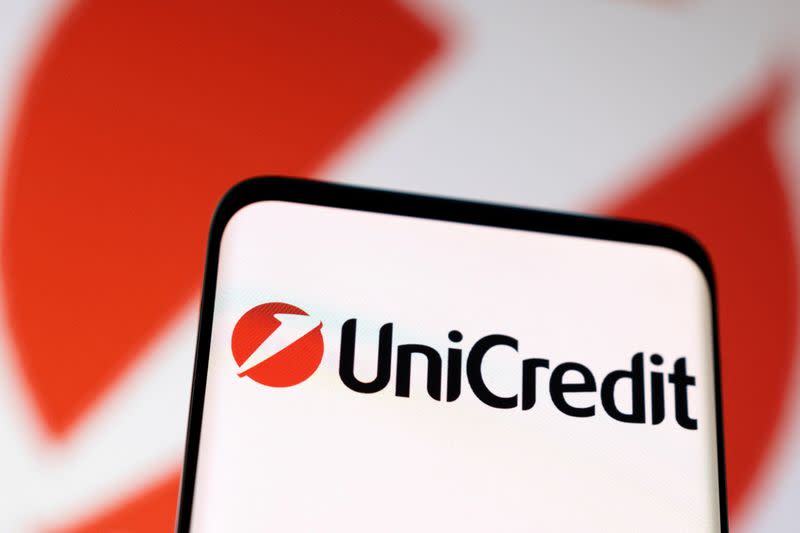UniCredit contests ECB demands to cut Russia risks in EU court

By Valentina Za and John O'Donnell
MILAN (Reuters) -UniCredit said on Monday it was challenging the terms set by the ECB for the Italian bank to cut its exposure to Russia, and seeking a ruling from the EU's General Court, as well as a freezing of the request in the meantime.
Euro zone banks still involved with Russia more than two years after Moscow invaded Ukraine have come under growing pressure in recent weeks from the bloc's supervisors, as well as U.S. authorities, over their ties to the country.
A complex regulatory backdrop, involving Western sanctions against Moscow and local laws in Russia where the Italian group runs a retail bank, meant it had to "seek clarity and certainty" on the actions it needed to take, UniCredit said in a statement
The application may take several months and will be preceded by a ruling on its suspension request in the coming months, UniCredit said, adding that it was necessary to avoid potential "serious unintended consequences" of the ECB decision.
Italy's Foreign Minister Antonio Tajani welcomed the complaint, saying he shared the need for clarity.
"The ECB must take into account the situation in which Italian companies operate in Russia, in compliance with EU sanctions. Hasty decisions merely risk damaging Italian and EU companies," he said.
The European Central Bank has asked European lenders to provide a "clear roadmap" to exit the Russian market. In May, Bank of Italy Governor and ECB policymaker Fabio Panetta urged Italian banks "to get out" because of reputational risks.
UniCredit said that progress made so far to shrink its Russia business showed it was "fully aligned with ECB on the importance of reducing its presence in Russia".
However, it has "concerns about the terms upon which this reduction has to take place as provided for in the decision issued by ECB, that goes beyond the current legal framework".
The ECB declined to comment.
After Austria's Raiffeisen, UniCredit has the biggest exposure to Russia, where it runs a top 15 bank, among European lenders.
Raiffeisen has no plans to take legal action against the ECB over the request to reduce its Russia-related business, a spokesperson told Reuters on Monday.
"For anyone who believes that Ukraine's fight against Russia is important for the security of Europe, the fact that UniCredit stayed in Russia, made profits, and is now suing the ECB over their attempts to get it to leave, this doesn't look good," said Nicolas Veron of Brussels think tank Bruegel.
UniCredit has so far cut its Russia cross-border exposure by 91% and the local exposure by 65%, with "further substantial reductions" planned.
European banks still active in Russia have also been facing pressure from the United States.
Treasury Secretary Janet Yellen told Reuters in May that the lenders faced "an awful lot of risk" and Washington was looking at stronger secondary sanctions on banks found to be aiding transactions for Russia's war effort.
Western sanctions have complicated European banks' exit efforts by curtailing the number of potential buyers. Under restrictions imposed by Moscow, an exit is now conditional on approval by President Vladimir Putin.
Russia's central bank must also give a green light.
Highlighting the difficulties, another Italian lender Intesa Sanpaolo is still to finalise its exit, despite securing the presidential decree authorising it to dispose of its Russian assets last September.
(Additional reporting by Alexandra Schwarz-Goerlich in Vienna; Editing by Elisa Martinuzzi and Alexander Smith)

 Yahoo Finance
Yahoo Finance 